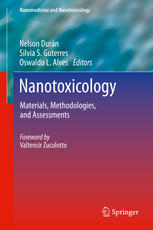

Most ebook files are in PDF format, so you can easily read them using various software such as Foxit Reader or directly on the Google Chrome browser.
Some ebook files are released by publishers in other formats such as .awz, .mobi, .epub, .fb2, etc. You may need to install specific software to read these formats on mobile/PC, such as Calibre.
Please read the tutorial at this link: https://ebookbell.com/faq
We offer FREE conversion to the popular formats you request; however, this may take some time. Therefore, right after payment, please email us, and we will try to provide the service as quickly as possible.
For some exceptional file formats or broken links (if any), please refrain from opening any disputes. Instead, email us first, and we will try to assist within a maximum of 6 hours.
EbookBell Team

4.1
50 reviewsThis book takes a systematic approach to nanotoxicology and the developing risk factors associated with nanosized particles during manufacture and use of nanotechnology. Beginning with a detailed introduction to engineered nanostructures, the first part of the book presents concepts and definitions of nanomaterials from quantum dots to graphene to fullerenes, with detailed discussion of functionalization, stability, and medical and biological applications. The second part critically examines methodologies used to assess cytotoxicity and genotoxicity. Coverage includes interactions with blood (erythrocytes), combinatorial and microarray techniques, cellular mechanisms, and ecotoxicology assessments. Part three describes cases studies both in vitro and in vivo for specific nanomaterials including solid lipid nanoparticles and nanostructured lipid carriers and metallic nanoparticles and metallic oxides. New information is also presented on toxicological aspects of poloxamers and polymeric nanoparticles as drug carriers as well as size effects on cytotoxicity and genotoxicity. Didactic aspects are emphasized in all chapters, making the book suitable for a broad audience ranging from advanced undergraduate and graduate students to researchers in academia and industry. In all, Nanotoxicology: Materials, Methodologies, and Assessments will provide comprehensive insight into biological and environmental interactions with nanostructures.